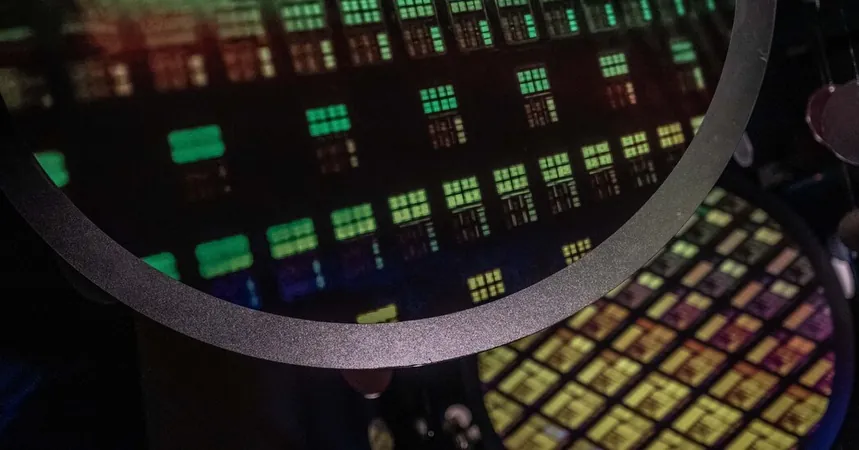
Trump Set to Unveil Semiconductor Tariffs 'Very Soon'—What It Means for the Industry
2025-04-14
Author: Wei
In a bold move that could shake up the tech industry, President Trump is gearing up to announce new tariffs on semiconductor imports this week. This comes as part of a broader trade investigation focused on national security.
These tariffs could significantly increase costs for importing semiconductors—essential components found in everything from electronics and cars to toys. The U.S. currently relies heavily on semiconductor supplies from Taiwan and other Asian countries, a situation deemed a critical national security risk by both Democrats and Republicans.
Trump claims the tariffs will motivate companies to bring chip production back to American soil, yet critics question the effectiveness of such tariffs in shifting an industry deeply entrenched in Asia.
Speaking aboard Air Force One, Trump hinted that announcements regarding tariffs on electronics were imminent, though he appeared open to exemptions for certain companies. "You have to show a certain flexibility... Nobody should be so rigid," he noted.
This latest development follows Trump’s dramatic pivot on tariffs, having recently boosted rates on Chinese imports to as high as 145% while excluding major electronics like smartphones and laptops. This decision seems to have been made to prevent backlash against an increase in consumer prices.
Industry insiders suspect that the administration’s fluctuating tariff strategy is driven by a desire to placate tech giants such as Apple, who have argued against the tariffs due to their potential harm.
The president’s erratic approach to tariffs has caused upheaval in financial markets, shifting strategies for companies around the world. Trump originally rolled out "reciprocal" tariffs that would target many electronics-producing countries, including Vietnam, before freezing these for three months to facilitate trade discussions.
This tariff initiative would tap into Section 232 of the Trade Expansion Act of 1962, allowing the president to impose tariffs for national security reasons. Trump has previously applied this authority to steel, aluminum, and automobile imports, and is also probing other sectors like lumber and pharmaceuticals.
While Trump believes these semiconductor tariffs will compel companies to establish factories in the U.S., critics remain skeptical, especially as the Biden administration's grants for chip factories are at risk. Countries like China, Japan, and South Korea continue to heavily subsidize their semiconductor industries.
Globally, an impressive 105 new chip factories, or fabs, are slated to be operational by 2028, with a mere fifteen located in the U.S. This stark reality showcases how crucial it is for America to revamp its semiconductor strategy.
Trump has been vocal in dismissing the CHIPS Act—an ambitious $50 billion initiative by the Biden administration to incentivize domestic chip manufacturing—as a waste of funds, insisting that tariffs alone are sufficient.
Some tech leaders are indeed answering the call, with Taiwan Semiconductor Manufacturing Company announcing a major investment of $100 billion for U.S. expansion. Nvidia also plans to manufacture supercomputers for AI entirely on American soil, projecting a staggering $500 billion in AI infrastructure production over the next four years.
Nvidia CEO Jensen Huang emphasized the historic nature of this move, stating, "The engines of the world’s A.I. infrastructure are being built in the United States for the first time."
As developments unfold, all eyes will be on Trump's announcement—what will these tariffs mean for the future of technology in America?



 Brasil (PT)
Brasil (PT)
 Canada (EN)
Canada (EN)
 Chile (ES)
Chile (ES)
 Česko (CS)
Česko (CS)
 대한민국 (KO)
대한민국 (KO)
 España (ES)
España (ES)
 France (FR)
France (FR)
 Hong Kong (EN)
Hong Kong (EN)
 Italia (IT)
Italia (IT)
 日本 (JA)
日本 (JA)
 Magyarország (HU)
Magyarország (HU)
 Norge (NO)
Norge (NO)
 Polska (PL)
Polska (PL)
 Schweiz (DE)
Schweiz (DE)
 Singapore (EN)
Singapore (EN)
 Sverige (SV)
Sverige (SV)
 Suomi (FI)
Suomi (FI)
 Türkiye (TR)
Türkiye (TR)
 الإمارات العربية المتحدة (AR)
الإمارات العربية المتحدة (AR)